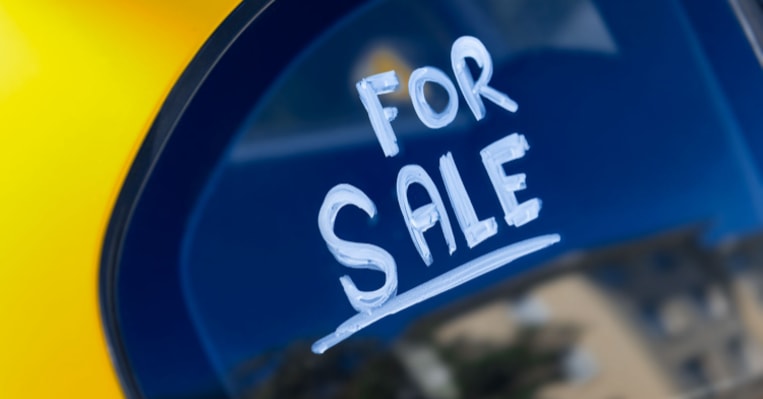
BBB Tip: Avoiding illegal car sales known as “curbstoning”

(Getty)
Better Business Bureau Serving New Mexico and Southwest Colorado is working with the New Mexico Independent Auto Dealers’ Association to raise awareness about illegal curbside car sales.
Curbstoning involves a commercial dealer pretending to be a private seller in order to evade city or state regulations imposed on authorized automotive dealers. This practice is called “curbstoning” because the seller in these types of shady sales tends to conduct the sale in a parking lot or with the car parked curbside on the street. Curbstoners also often list vehicles online via forums, marketplaces, and various third-party sites. By selling these vehicles via curbside, vacant parking lots, or online posts, curbstoners are able to avoid paying taxes and following mandated consumer protection laws, such as Lemon Laws. Curbstoners often offer these vehicles at great prices, creating an enticing offer for car shoppers.
Curbstone sellers are different from private sellers. Individuals who sell their own vehicles are not considered curbstone sellers. Curbstoners often have multiple vehicles listed for sale. These shady auto sellers tend to make up backstories to hide the fact that they are commercial dealers. An easy way to figure out if a vehicle is being sold by a curbstoner, initiate the conversation with the seller by asking about “the car.” A private seller is likely to only have one vehicle for sale at a time, whereas a curbstoner will probably have several cars and trucks listed for sale and will need you to identify which car you are interested in.
Curbstoning is a way for auto dealers to get rid of cars they would not be able to sell otherwise for a variety of reasons. Some of these cars are salvage vehicles that have been dressed up to seem to be in fair condition or they are still being paid off. Vehicles sold on the curbside may even be stolen. According to CarFax, some of the reasons a curbstoner might give for selling a vehicle are:
- “It’s a sick relative’s car.”
- My kid is away at college and asked me to help sell their car.”
- “I just moved and some paperwork went missing, but everything is OK with the car.”
- “I’m in a rush and other people are very interested, we need to finalize the deal right here and now.”
BBB Scam Tracker receives reports from used car buyers of similar scams. One person shared their experience, "My son recently purchased his first car from [name redacted] on Facebook Marketplace, and regrettably, the vehicle had significant undisclosed mechanical issues...To his credit, he agreed to exchange the vehicle for another one. However, upon receiving the replacement car, my son discovered that it also had major mechanical problems. My son tried to inform him of this, [name redacted] refused to return any of his phone calls or texts. In addition, [name redacted] refuses to provide him with a bill of sale for the car."
The NMIADA recommends the following tips to avoid getting scammed by a curbstoner:
- Ask the seller in the first call whether the title is in his/her name. If the answer is “no” just hang up. They will tell you it is their auntie’s car or their sister out of state. It is illegal in New Mexico to sell a vehicle that is not titled to the seller, and you will end up paying taxes and penalties on every sale of the vehicle that was not reported. Ask the seller to give you the VIN number of the vehicle. Ask the seller if the vehicle is salvaged and whether the miles shown are actual.
- Check the car out online. A lot of data can be had for free. First, check to see if the vehicle has any open recalls from the manufacturer. Use the VIN tool at the NHTSA’s website: NHTSA.gov/recalls. You can also check whether the vehicle is stolen or salvaged for free by looking the vehicle up on the NICB’s website: NICB.org/vincheck. You can also go to a number of pay sites, including AutoCheck and CarFax to get detailed histories for the car.
- Be cautious where you meet a seller for a test drive. Make sure it is in a very public place to ensure your safety. If you like the car, arrange for a pre-purchase mechanical inspection of the vehicle during your test drive. If the seller won’t agree – don’t buy that car!
- Check the title out fully. Check the seller’s driver's license to ensure he/she is the registered owner. Does the VIN match the VIN on the vehicle? If the title says that it is a Duplicate Title, be cautious and do not buy the vehicle until you have had a chance to check the vehicle and ensure that it has not been sold twice.
- Document everything. Make sure to print and save all internet ads, text messages and emails between you and the seller. This will allow you to prove what went on in case something goes awry with the deal.
To report curbstoning, visit BBB.org or NMIADA. If you have experienced a scam, report it to BBB Scam Tracker to warn others.
Still Need Assistance?
Contact Your Local BBB
Your local Better Business Bureau can assist you with finding businesses you can trust. Start With Trust®.
Additional Resources
Let BBB help you resolve problems with a business
Research and report on scams and fraud using BBB Scam Tracker
Learn more about the value of BBB Accreditation